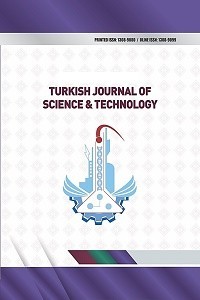Temrezli’de (Sorgun, Yozgat) Yetiştirilen Triticum Sativum Bitkisinde U ve Th Birikimi ve Taşınması
Zenginleştirme katsayısı, fitoremeditasyon, uranyum, toryum, Triticum sativum bitkisi
U and Th Transport and Uptake in Triticum Sativum Cultivated Farmland in the Temrezli (Sorgun, Yozgat, Turkey) U and Th Mining Area
___
- [1] Jones LD. Uranium And Thorium Occurrences In British Columbia. Ministry of Energy, Mines and Petroleum Resources, 1990; 32: pp.78. [2] ATSDR. Toxicological profile for Carbon Tetrachloride. Atlanta, GA: U.S. Department of Health and Human Services, Public Health Service 2005. [3] Sheppard MI, Sheppard SC. The plant concentration ratio concept as applied to natural U. Health Phys. 1985; 48: 494-500. [4] Kabata-Pendias A, Pendias H. Trace elements in soils and Plants. 3rd Edition, CRC Press, Boca Raton, 2001; 403 p. [5] Buck EC, Brown NR, Dietz NL. Contaminant uranium phases and leaching at the Fernald site in Ohio. Environ. Sci. Technol. 1996; 30: 81–88. [6] Airey PL, Ivanovich M. Geochemical analogues of highlevel radioactive waste repositories. Chem. Geol. 1986; 55: 203–213. [7] Shtangeeva I. Uptake of uranium and thorium by native and cultivated plants. Journal of Environmental Radioactivity, 2010; 101: 458–463 [8] Aydin N. Investigation Of Geology, Geochemistry And Operability Of Temrezli (Sorgun – Yozgat) Uranium Deposit. Balikesir University Institute Of Science Geological Engineering Balıkesir, Ph.D Thesis, 2016; 112 p. [9] MTA (Mineral Research and Exploration General Directorate). The potential, trade and expected developments of the metal and mineral resources in the world and Turkey. XII, 1987; Release number: 197 [10] Brown SL, Chaney RL, Angle JS, Baker AJM. Phytoremediation potential of Thlaspi caerulescens and bladder campion for zinc and cadmium contaminated soil. J. Environ. Qual. 1994; 23: 1151-1157. [11] Baker AJM, Reeves RD, Hajar ASM. Heavy metal accumulation and tolerance in British populations of the metallophyte Thlaspi caerulescens. New Phytologist 1994; 127: 61-68. [12] Whicker FW, Hinton TG, Orlandini KA, Clark SB. Uptake of natural and anthropogenic actinides in vegetable crops grown on a contaminated lake bed. J. Environ. Radioact. 1999; 45: 1–12. [13] Wei CY, Chen TB, Huang ZC. Cretan bake (Pteris cretica L.): an arsenic-accumulating plant. Acta Ecol Sinica 2002; 22: 777-782. [14] Chen SB, Zhu YG, Hu QH. Soil to plant transfer of 238U, 226Ra and 232Th on U mining-impacted soil from southeastern China. J. Environ. Radioac. 2005; 82: 223-236. [15] Zhao FJ, Lombi E, Mc Grath SP. Assessing the potential for zinc and cadmium phytoremediation with the hyperaccumulator Thlaspi caerulescens. Plant Soil 2003; 249: 37-43. [16] WHO. The World health report 2007: a safer future. WHO Library cataloguing – in – Publication data, Geneva, Switzerland 2007. [17] Govindaraju K. Compilation of working values and sample description for 383 geostandards, Geostand. Newslett 1994; 18, 1. [18] Ahmad SM, Tansey TR, Busser BW, Nolte MT, Jeffries N, Gisselbrecht SS, Rusan NM, Michelson AM. Two forkhead transcription factors regulate the division of cardiac progenitor cells by a polo-dependent pathway. Dev. Cell, 2012; 23(1): 97-111.
- ISSN: 1308-9080
- Başlangıç: 2009
- Yayıncı: Fırat Üniversitesi
Temrezli’de (Sorgun, Yozgat) Yetiştirilen Triticum Sativum Bitkisinde U ve Th Birikimi ve Taşınması
Determination of Rheological Behavior of Some Molasses-Sesame Blends
Fethi Kamışlı, Dlshad Abdalla Mohammed
Importance Of Length-Length And Length-Weight Relations In Crayfish
Co Katkılı ZnO Nanomalzemelerin Optik ve Morfolojik Özelliklerinin Araştırılması
Olaniyi Alaba OLOPADE, Henry Eyina DIENYE, Samuel Kweku Konney AMPONSAH
